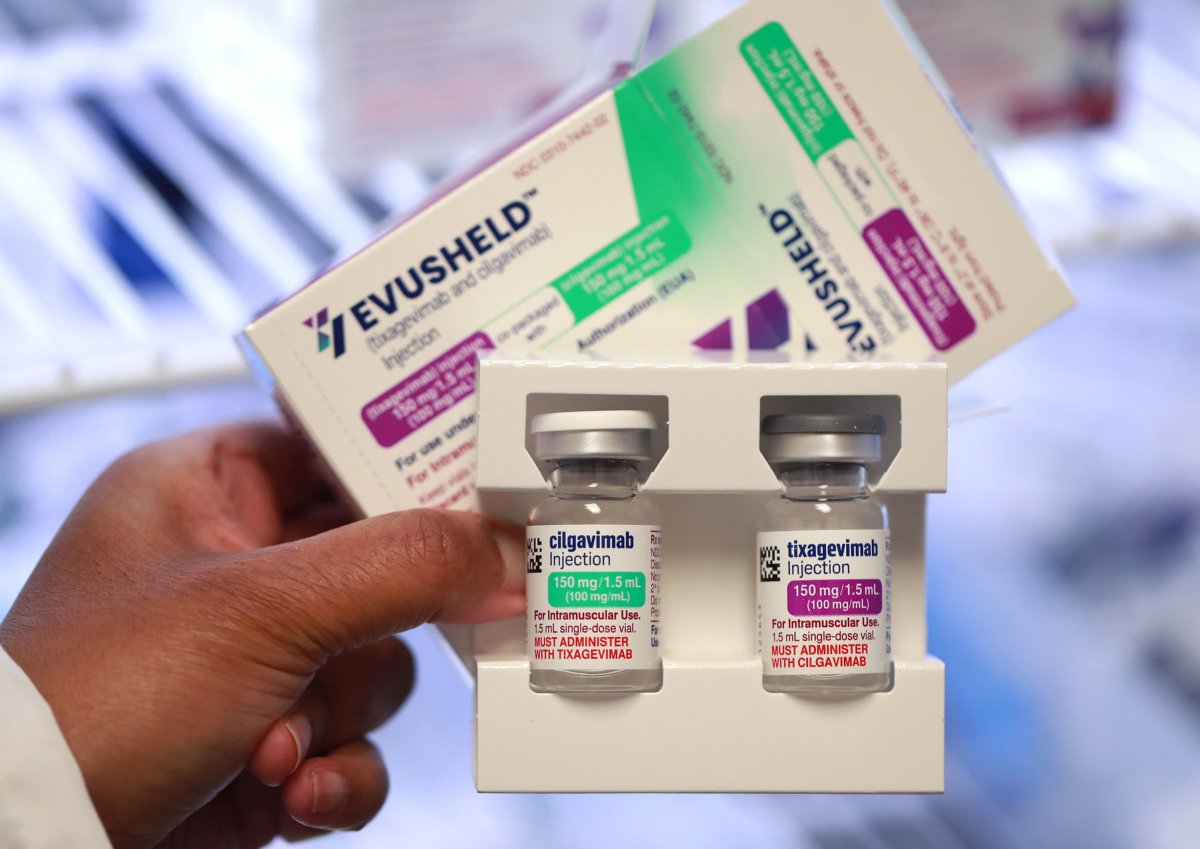Health Canada approved on Oct. 19 AstraZeneca’s antibody combination Evusheld injection — which was already approved as a COVID-19 prevention tool — as a treatment for the virus.

A spokesperson for Alberta Health Services told Global News on Tuesday that the province is “awaiting the treatment guidance from Canada’s Drug and Health Technology Agency, which is expected to be available before the end of the month, prior to making any decisions on the treatment use of COVID-19 with Evusheld.”
AHS spokesperson Kerry Williamson said Evusheld is currently available in Alberta for the prevention of COVID-19. In terms of treatment options, he said Albertans currently have access to Paxlovid and remdesivir, “which are used for the same indication that Evusheld has just been approved for.”
To date, Alberta has administered about 1,581 Evusheld doses and has “a healthy supply remaining,” Williamson said.
AstraZeneca Canada said Evusheld, a long-acting antibody combination, has received a Notice of Compliance from Health Canada to treat mild to moderate COVID-19 for those aged 12 or older.
Evusheld was approved in April for the prevention of COVID-19 in immunocompromised people, such as organ and stem cell transplant recipients and chemotherapy patients. The injection drug prevents infection by providing antibodies that a vulnerable person may not be able to make on their own through vaccination.
Alberta Health Services has been offering the drug — in its preventative form — since May through mobile units. AHS subcontracted ACESO Medical to drive special vans to patients across Alberta.

Public health physician Dr. Jia Hu says the more options for both the prevention and treatment of COVID-19, the better.
He said some of the currently available options may have drug interactions preventing some Alberta patients from using them.

Get weekly health news
“It’s great that we have this (Evusheld) available for treatment as well,” Hu said. “I think it’s also great that we have all these bivalent vaccines.
“So, whether it’s a bivalent vaccine for prevention, or Evusheld for prevention, or Paxlovid or Evusheld for treatment, the more the merrier. We just really need people, doctors, to recommend it.”
Hu said Health Canada usually approves a drug for a particular use first and then provinces determine how they want to make it available and to whom.
He said the uptake of preventative Evusheld is still pretty low across Canada.
“I think a lot of folks just aren’t really aware of it, that includes both patients and physicians,” Hu said.
“In terms of the treatment indication for Evusheld, it’s still pretty early days. The provinces and territories are figuring out who to give it to.”
So far, the main treatment therapy for COVID-19 has been Paxlovid, he added, which is given orally and works quite well.
“But uptake of that is also not super high… I think this is sort of a symptom of increasing COVID fatigue,” Hu said.
“People are certainly very tired of vaccinations, which is unfortunate. We have all these great bivalent vaccines coming out, which do work better, we think, than the original vaccines,” he added.
“But if you look at the uptake of vaccinations, our primary series, Canada reached like 90 per cent, and then for that first booster (it) was like 50 per cent and for the second booster, it’s like 15 per cent.

“I think people are tired of COVID, I think people are less concerned about COVID being as severe now that so many people have gotten it. But as we head into the fall and winter season, we’re certainly going to see a surge in cases. We’re certainly also not going to close down, which I think is good and appropriate — that stuff can be pretty harmful.
“Right now, whether it’s Paxlovid or Evusheld or vaccines, whatever you want to say, they’ve given us the ability to live with COVID, essentially, and to live with COVID in a way where very few people need to die, very few people need to be hospitalized.
“But for any of these things to work, we need people to take them.”
Hu said Alberta has done a good job of making vaccines and other COVID-19 prevention and treatment options available.
“I wouldn’t say our problem right now is distribution — of course, you can always make that better — I think our problem right now is uptake, awareness, desire.”






Comments